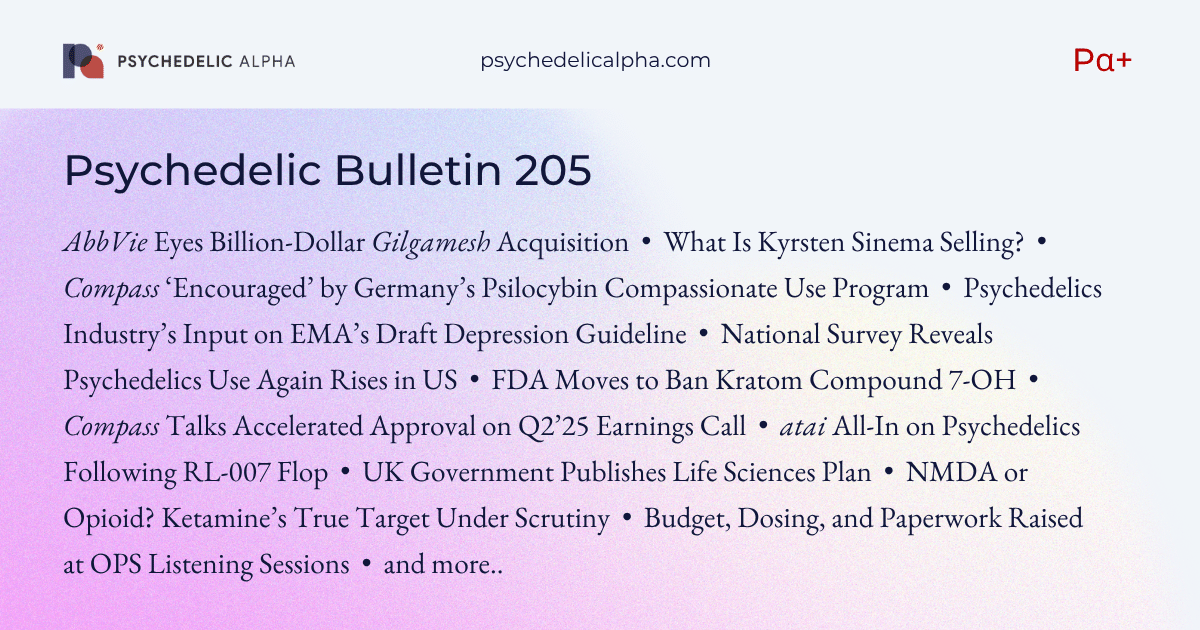In this Issue
- AbbVie Eyes Billion-Dollar Gilgamesh Pharmaceuticals Acquisition
- What Is Kyrsten Sinema Selling?
- Compass Pathways ‘Encouraged’ by Germany’s Psilocybin Compassionate Use Program
- Psychedelics Industry’s Input on EMA’s Draft Depression Guideline
- National Survey Reveals Psychedelics Use Again Rises in US
- FDA Moves to Ban Kratom Compound 7-OH
- Compass Pathways Talks Accelerated Approval on Q2’25 Earnings Call
- atai Life Sciences All-In on Psychedelics Following RL-007 Flop
- UK Government Publishes Life Sciences Plan
- NMDA or Opioid? Ketamine’s True Target Under Scrutiny
- Budget, Dosing, and Paperwork Raised at OPS Listening Sessions
- and more…
***
AbbVie Eyes Billion-Dollar Gilgamesh Acquisition
On Wednesday, Bloomberg became the first to publicly report on a rumour that has been working its way around the field in the past few weeks: AbbVie is apparently in talks to acquire Gilgamesh Pharmaceuticals in a transaction that would value the company at around $1 billion
The authors of the Bloomberg piece say the deal highlights “growing takeover interest in the sector”. At market open on Thursday, shares in psychedelics companies popped. atai Life Sciences and Compass Pathways traded up more than 10% at open, for example.
The news comes two months after Gilgamesh shared positive topline data from a 40-patient study of GM-2505 (aka bretisilocin, a serotonergic psychedelic) in major depressive disorder (MDD). (We first covered the data in early May, a couple of weeks before the company formally announced the results and took an interview with Psychedelic Alpha.)
That topline data reported a -18.5 MADRS change from baseline at 24 hours in the 10 mg group, which grew to -21.6 at day 14: a 9.6-point reduction over the 1 mg control group, demonstrating convincing separation.
Those results, in turn, came just over a year after AbbVie’s original deal with the company was announced.
While GM-2505 is the private company’s lead, it’s also developing GM-1020 (an NMDAR antagonist also targeting depression) as well as neuroplastogens and GM-3009, a ‘safer ibogaine analog’ which has been awarded a $14M grant by NIDA.
It’s all a little odd, however, as an AbbVie representative swiftly reached out to Psychedelic Alpha when we reported on the breaking news of its investment in Gilgamesh last May. In our article, we had written: “AbbVie has become the latest large pharmaceutical company to dip its toes into psychedelic drug development”.
The AbbVie representative told us that the company “is focused on the research and discovery of next-generation neuroplastogens, which are a distinct, novel class of compounds” that “are well-differentiated from psychedelics in that they are not expected to elicit any hallucinogenic or dissociative effects” (emphasis added).
But GM-2505, and of course GM-3009, certainly produce subjective effects. Indeed, in an interview with Psychedelic Alpha, Chief Strategy and Development Officer Jorge Quiroz emphasised just how psychoactive the lowest 1 mg dose was, describing it as “very psychoactive in this population of patients”, to the extent that the team were “a bit surprised” when they discovered this.
So, has AbbVie warmed up to psychedelics, or are Gilgamesh’s neuroplastogens driving much of the valuation? We think the former.
Aside from gossip, speaking in May at the Federal Summit on Psychedelic Medicines in DC, Gilgamesh Pharmaceuticals CEO Jonathan Sporn said that its engagement with AbbVie started with the company looking at its “neuroplasticity-enhancing agents that actually are not prone to inducing a psychedelic experience”. “That’s how the engagement with them begun…it did start with that more conservative approach”, he added, perhaps alluding that there might have been movement in the company’s Overton Window since.
Gilgamesh had the idea in its mind, he continued, that once it began reading out data for its psychedelic compounds, “that this would lead to a dialogue with [AbbVie] and we’d start to get them comfortable with this larger issue.”
“My sense with AbbVie at this point…is that they are very, very data-driven”, he added. “They are throwing away what we thought could be some major concerns about stigma, about [whether] a company as large as AbbVie is really going to be the leading edge here for something as controversial as psychedelic drugs.”
He said his experience, so far, is that they are not biased in that way, but are instead very data-driven.
The big pharma company could certainly do with bolstering its psychiatry pipeline. It currently markets Vraylar (cariprazine) for schizophrenia, but its key patents for that product expire in the next few years. (Outside of psychiatry, its controversial Humira patent thicket is also finally thinning out.)
On the development side, its emraclidine candidate for schizophrenia, which it purchased via a $9bn acquisition of Cerevel Therapeutics, failed in Phase 2. Other than that, it has ABBV-932 in Phase 2 for bipolar depression (BD) and generalised anxiety disorder (GAD) and icalcaprant and fosigotifator in Phase 1 for BD and major depressive disorder (MDD), respectively.
Psychedelics investors welcomed the rumoured transaction as evidence that big pharma is increasingly interested in psychedelics companies. ‘It’s a major endorsement for the field’, one investor-operator told Psychedelic Alpha.
Daniel Goldberg, a Partner at VC firm Palo Santo, told us that…
Sign-in or join Pα+ to continue reading this Issue of the Psychedelic Bulletin…
Join Pα+ Today
Independent data-driven reporting, analysis and commentary on the psychedelics space: from business and drug development through to policy reform and culture.
Already a member? Log In
✓ Regular Bulletins covering key topics and trends in the psychedelics space
✓ Regular articles and deep dives across psychedelic research, policy and business
✓ Interviews with insiders
✓ Monthly interactive database and commentary on psychedelic patents
✓ Quick-take analysis of major developments
✓ A Library of primers and explainers
✓ Access to our full back catalogue


